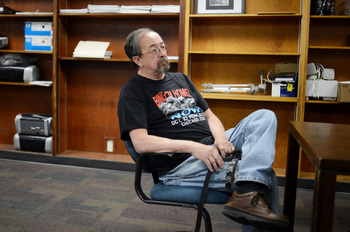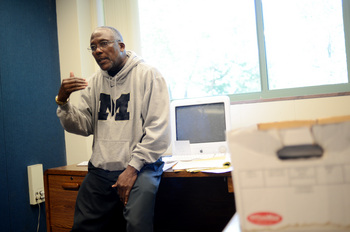COPE's final day: Teachers at alternative school reflect on program's 41 years

COPE teacher and former student Meg Maxwell sorts through papers as she cleans out a classroom on Wednesday morning in preparation for the program's closing.
Melanie Maxwell I AnnArbor.com
Previous coverage: COPE alternative school for expelled students to close after 41 years
Meg Maxwell was a senior in high school in 1977 when she was introduced to the Center for Occupational and Personalized Education (COPE).
Today, she will place the last lid and close the final box on her 18-year history with COPE.
As she stacked and sorted papers at the former Chapelle Elementary School in Ypsilanti this week in preparation for the closure of the alternative education program, she was brought to tears reflecting on her COPE experience — one that truly shaped the direction of her life.
Maxwell entered COPE as a teenager seeking extra credits for graduation. Today, she will leave COPE as a teacher with a master’s degree in educational psychology and a wealth of stories from children, like her former self, who were motivated to succeed by the program’s loving staff.
COPE only had existed for six years when Maxwell began attending the program in the evenings after school for credit recovery, but COPE already had undergone significant changes.
It had morphed from a residential program for adjudicated girls, to a day treatment facility for troubled youth of all genders, to a program that accepted both court- and school-referred children.
It had transitioned from a 24-hour facility to a 12-hour facility that offered not only counseling and life skill services, but also an educational component, said COPE Executive Director Bob Coller.
In recent years, the program operated much like a typical school day from about 8 a.m. until 2 p.m., Coller said, adding lunch and passing times at COPE were shorter than those at the public school districts.
“I guess I took too many study halls or something,” Maxwell said of her reasons for needing to attend COPE in 1977. She acknowledged in those early years at COPE, she stuck out like a sore thumb as being “just your average kid.”
“I remember thinking then that the kids here were so rude and some actually had done some pretty bad things,” she said.
The program at the time was still comprised of mostly court-referred students, dropouts or at-risk kids, she said. Coller added the 1980s is when the shift to more district-referred students and fewer court-referred students began taking place. Today, 50 percent to 60 percent of the youth served have special education needs, he said.
Despite being considered “average,” Maxwell said the instructors at COPE still took time to address her individual needs.
“The dean asked me, ‘What would you like to study? What interests you?’ I said psychology and they created a psychology class for me,” she said.
Nate Reid, who taught at COPE for 37 of its 41 years, was one of Maxwell’s instructors — her favorite, she said.
“He taught me everything I know about being a teacher,” Maxwell said Wednesday, choking back tears.
Reid helped Maxwell get a job at COPE after she graduated from college.
“On a lark, I stopped by (the school) to see if any of my old teachers were still here and I was so surprised to see that they were. I didn’t truly understand the dedication then,” she said, her eyes welling with the memory. “When Nate asked what I was doing now and I told him I was actually a teacher, he asked if I wanted a job … and then he made it happen.”
Maxwell taught at COPE through her first, second and third pregnancies, at which point it was no longer “cost effective” for her to work for a nonprofit, she said. She went on to other opportunities while she raised her children; but 10 years ago, Maxwell went through a divorce and Coller asked if she wanted her old job back.
“There really is no place like this place,” she said, tearfully. “The impact of this program — it can’t easily be measured. … Each student is like a puzzle piece, as individual as the individuals themselves. … What these kids are dealing with — the stories would make your skin crawl. … Their needs have to be addressed for them to find success in academics. We team up and determine what makes that kid tick and what it will take for him to be successful.”
COPE’s Board of Directors voted Monday to close the school because of financial constraints.

Executive Director of COPE Bob Coller leans back in his chair as he answers questions during an interview at the school on Wednesday morning.
Melanie Maxwell I AnnArbor.com
“We reached the point where we could no longer dip below the amount we were at or we could not have afforded the cost of dissolving the corporation, which would not make us a very good corporate citizen,” he said.
Kim Diebboll, the school’s psychologist, said the news was devastating but that funding has been an issue for each of the 11-plus years she has been employed with COPE.
“Every year, we were grateful to continue educating children,” she said. “These are some of the best darn people I have ever worked with in my life. … What I will miss most is not being here for those kids that want to come back and tell us their success stories.”
Diebboll, whose office on Wednesday was the least packed up among her colleagues, said she is still in denial and is angry about the decision.
“I’m grieving,” she said. “The hardest part is not choosing this … and the effect it will have on so many young people in this county.”
COPE served a total of 78 students in 2011-12. At the end of the school year, it had 58 students enrolled.
Of the students it served, Coller said 23 were referred from Ypsilanti Public Schools, 20 from Willow Run schools, 11 from Ann Arbor, seven from Whitmore Lake, six from Lincoln, five from Dexter, three from Milan, two from Saline and one from Chelsea.
Seven of the 78 students came to COPE as the result of an expulsion. Three of those expulsions were because the students brought a weapon to school, Coller said.
Forty-two of the students qualified as special needs, Coller added. One student received special education services for cognitive impairment, 10 for emotional impairment, 23 for learning disabilities and eight students had other health issues or physical disabilities, he said.
Each of the Washtenaw County school districts pays $7,000 per seat per year to secure a set number of spots at COPE. The cost has varied throughout the years, but Coller said recently it has remained constant. In total, county districts set aside 72 seats in 2011-12.
He said some districts choose to fill all of their “reserved” seats with referrals, while others leave a few seats open each year in case they have students throughout the year that develop a need.
COPE’s operating budget for the 2011-12 fiscal year, which ends July 31, was $959,000, with projected revenues of $890,000. Coller said he anticipates the year will end at about those numbers.
It costs about $13,320 to educate each student, Coller said, so the districts’ contributions account for about 52 percent. The remaining funding for COPE comes from grants and the Washtenaw Intermediate School District. Also, for 15 years, up until about two years ago, $75,000 came from the federal government’s Safe and Drug-free Schools and Community Act.
The WISD’s contribution for 2011-12 was $283,000. The Washtenaw County Health Organization awarded COPE an annual $25,000 grant, while the United Way gave $42,000.
Students are typically with COPE for one to four semesters, Coller said, adding the goal is always to re-integrate the student into his or her public school district. COPE does not offer a diploma, so students must graduate from their home district.
He said a number of COPE’s students have had multiple long-term suspensions or ongoing behavioral or discipline problems while attending their traditional public school. Twenty percent to 25 percent of the kids have a probation officer or caseworker and almost all are lacking basic math and reading skills, he said.
“We try to meet them where they are when they get here and move them forward (academically) as many grade levels as we can,” Coller said.
He added the individualized teaching approach and the fact that COPE can accept students who have been expelled or brought weapons to school sets it apart from other district-run alternative education programs in the county.
According to state law, students who have been expelled cannot return to their residential district for 180 days — a whole school year — and in some cases, a petition or Board of Education approval is required for their return. A student who has been expelled for bringing a weapon to school cannot enroll in any Michigan school district for 180 days, per state law.
Coller said in the mid-1990s, COPE expanded its services to allow these students to be admitted into the program. He said because the school is run by a nonprofit organization, it is permitted.
The lower student-to-teacher ratio plays a role in COPE’s remediation success, Coller said. On average, there are five to 10 students per class. Coller said the staff is better able to deal with truancy and behavioral issues than the public schools because of the small student population.

COPE teacher Nate Reid talks about the relationships he built with students during his 37 years at COPE.
Melanie Maxwell I AnnArbor.com
“In a classroom with 30 to 40 kids, a teacher is likely to ignore it … but with five kids we can address it. So we don’t have to discipline, rather we can counsel kids and work with them,” Coller said. “Then we are not responding to the event, we are responding to the potential for an event.”
Coller added many public school districts used to have truancy officers but because of budget constraints, very few do anymore. He said the courts also do not pursue truancy issues as diligently as they use to.
Reid has seen a range of students and families pass through his classroom in his 37 years with the program.
He said he has taught youngsters who simply needed guidance and discipline because they weren’t getting it at home; to students who had suffered abuse, neglect or sexual assault; to students who were extremely intelligent with active parents, and just found themselves in the wrong place at the wrong time and with the wrong people.
Reid has watched two of his students go on to become lawyers, two have come back to COPE as teachers, one opened a very successful pizza business, several have become social workers in an effort to help others and some are now very good bus drivers and doing other blue-collar jobs, he said.
And then, Reid added, flipping through a box of letters and mug shots, there are those that COPE couldn’t help and are in jail.
But Reid said he keeps in touch with almost all of his former students or as many as he can find and track down.
“I write them letters in prison,” he said. “None of them are horrible people. They just make poor decisions.”
Coller said in his 27 years of working with Reid, he has never seen the teacher give up on a current or former student.
Reid said many of his students come back and thank him for his correspondence, admitting they were shocked to hear from their old COPE instructor.
“They didn’t take the letter and think, ‘This old fool. Why’s he writin’ me.’ … I hear how they needed that letter that day or how much it meant. … That’s why I won’t stop. I’m taking this box with me…
“They remain lit in my heart. It’s a beautiful thing, really.”
Staff reporter Danielle Arndt covers K-12 education for AnnArbor.com. Follow her on Twitter @DanielleArndt or email her at daniellearndt@annarbor.com.


Comments
LEB
Tue, Jun 12, 2012 : 3 a.m.
I have known Nate Reid for 34 of the 37 years that he taught at COPE. I have never met a more dedicated, caring and thoughtful teacher and mentor. COPE was a dream of the late Judge Francis O'Brien. I think he would have been pleased to see how his dream took hold and changed the future for literally hundreds of children in our community. Although COPE's closing is sad, we should be happy that it existed as long as it did. Perhaps, there are more Meg Maxwell's out there who because of the kindness they received while at COPE, will play it forward. Thanks Bob, Nate, Mike, and Meg. Thanks too to the late Evy Eugene Mavrellis and the late Judge Francis O'Brien. Because of you COPE will live on forever. /Linda Edwards-Brown
YpsiReader
Sat, Jun 9, 2012 : 1:24 p.m.
I have worked with many students over the years who found their way to this amazing program. Their model should be expanded, not shelved. The loss of COPE will mean the loss of HOPE for many young people.
vmann1
Sat, Jun 9, 2012 : 2:47 a.m.
I've enjoyed working with this incredible, dedicated staff and the COPE students part time over the past few years. Kids facing mature situations, beyond their years of experience - I don't know how the teachers do it on a daily basis. I don't know how some of the kids keep getting up and putting one foot in front of the other on a daily basis. They are young warriors. " Beautiful, every one of them...and they don't even see it for all they're dealing with", is what I thought every day I entered the classroom. I wish the best...success and peace to all the staff and students.
Bob
Fri, Jun 8, 2012 : 10:24 p.m.
This is a real Loss. COPE has helped so many students.
lisa gottlieb
Fri, Jun 8, 2012 : 4:24 p.m.
It has been a pleasure and an honor to work with Bob and Nate, as well as school social worker Charlotte Yu and other staff at COPE over the last dozen years, as students from the WISD Court Involved Youth Program where I work transitioned to COPE. I am terribly disappointed that our county school districts will no longer have COPE as an option. Thank you for all your years of service to youth in our community.
tom swift jr.
Fri, Jun 8, 2012 : 8:44 p.m.
Lisa, a slight correction just to keep the record straight. COPE's Psychologist (the only Social Worker on staff is the Director, Bob Coller, who is a LMSW) is Kim Diebboll, quoted in the article above. Charlotte is a great Social Worker, but she works for Forest School.
kludwig
Fri, Jun 8, 2012 : 2:27 p.m.
Having worked with students at COPE and with Bob and Nate I'm sad and angry that the kids who they have served for so many years are, again, denied opportunity. The schools throughout the county have a long history of pushing kids out and the very few, not enough, places like COPE were their only realistic chance to stabilize their lives. Public education is seriously impaired and, in many ways, utterly broken and the most severely impacted victims of these circumstance are the most vulnerable kids. Compare the cost of educating wounded kids with the cost of incarceration and this latest social failure becomes even more short sighted and stupid. The COPE kids need support. They do not need to be abandoned yet again.
Mary Wakefield
Fri, Jun 8, 2012 : 2:12 p.m.
Our loss.
Tru2Blu76
Fri, Jun 8, 2012 : 1:59 p.m.
Lets be clear: if the public wants something in the way of government or non-profit programs, the funding is approved and it gets done. But obviously, the public collectively knows there are more needs than there is money from taxes. So its a matter of priorities and this COPE program wasn't included in the top priorities.
B Ellis
Fri, Jun 8, 2012 : 1:52 p.m.
Schools like this are essential. We can't keep letting kids just "fall through the cracks" - we all end up paying, in a very big way, in the end if kids aren't successful in school. We as a society have to put more emphasis on helping kids not discarding them. This is such a huge loss... the big corporations in our county should be stepping up and helping to keep this school OPEN!!! Gov. you're a Washtenaw County guy - you should be making sure that government AND private business keep places like this OPEN!!
northside
Fri, Jun 8, 2012 : 12:44 p.m.
Very sad to see a place like this close, especially at a time when it is needed so much.
ypsilistener
Fri, Jun 8, 2012 : 10:29 a.m.
Thank you for this article. It was both heartbreaking and heartwarming. Best wishes to the staff and students of COPE.